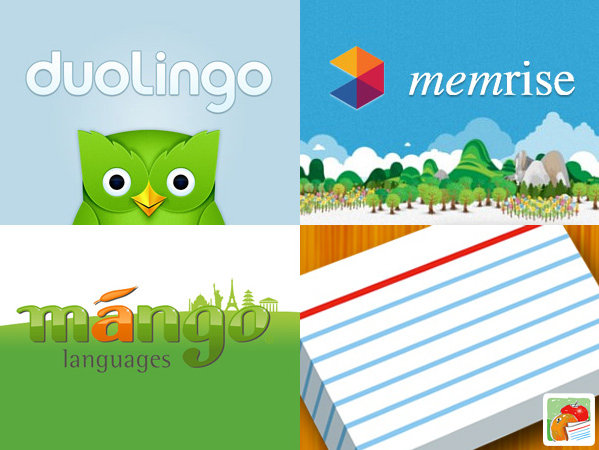It's been a week since you resolved to change your life. How are you doing so far? Yeah, me too.
There is a belief that making small, incremental changes is the best way to go about changing your life. This is why big goals like exercising and eating right often fail. While these big goals are always a good idea they're just too disruptive to handle with ease.
How about learning a new language? That may also sound like "too disruptive" of an idea. Learning a language is complex, time-consuming, and schooling and software sounds expensive.
Well thankfully in the past few years a solid group of apps have risen to the challenge of making language learning easy, fun and for the most part, free.
Here is a comprehensive review of what I've tried:

1. DuoLingo – free (Android, iOS, Web)
DuoLingo is a real winner in terms of design, fun and effectiveness. DuoLingo's goal is to immerse users into a language, rather than explain all the stuffy rules. There are reading, listening, and even speaking activities. The app strikes the perfect balance between being quick, productive and fun. There is a point system to compete with friends, a reward system to cash in for prizes and races against the clock. Don't feel competitive? There is still a lot of fun to be had. The designs are cute and the sounds are top notch.
The website also offers additional features over the app, including discussion forums for each lesson and real-world document translation for a tougher challenge.
One of the few drawbacks with this comprehensive system is that they currently only offer six languages to learn (German, French, Italian, Spanish, Portuguese, English), but there are plans to crowd source many more over time (Russian is next). Another problem is that immersion without rules can be confounding. For instance in German there are four versions of "you" that are never fully explained. It is best to pair your learning with a little online research. This goes for all apps.
DuoLingo was created in part by Carnegie Mellon professor Luis von Ahn, who created reCAPTCHA, which uses spam protection to digitize library books. Similarly, DuoLingo is free but is subsidized by selling your crowd-sourced translations to other companies. After you translate a sentence in another language that translation is then voted on. The highest voted translation wins.
DuoLingo won a lot of "App of the Year" awards in 2013 and has gone the furthest in making me feel fluent in this language.

2. Memrise – free (Android, iOS, Web)
Memrise is more of a flashcard-based system for learning vocabulary more than grammar. It allows for a variability of learning styles, for instance choosing the appropriate word out of a group or typing out the word from memory.
Memrise's helpful twist is providing mnemonics – which they call Mems – to help you make more interesting connections. For instance, the Norwegian word for "King" is "Konge," so a Mem might have you remember the movie "King Kong." Or the German word for "Fast" is "Schnell" so there might be a picture of a snail with rocket boosters. That's an image that's hard to forget, so you're more likely to remember that word. If you come up with a better connection, you are free to add your own.
Memrise also employs a metaphorical garden element to keep track of your learning process. New words start out as seeds, established words are planted in your garden, and words in your long-term memory get watered every so often. As you progress through your courses you can earn points and compete with other Mempals, though the ranking system is a little vague (Does a Memocrat come before or after a Membrain?).
Memrise is a crowd-sourced platform; unlike DuoLingo, where the lessons are curated by professionals, Memrise's users create the lessons. This is both it's strength and weakness; as a result the number of available lessons are vast (you can learn Klingon or Elvish or even mathematical principles) but the quality of the lessons is much more difficult to discern. Sometimes there are misspellings or grammatical errors. Sometimes the words have audio associated with them and sometimes they don't. Sometimes they have the appropriate gendered pronouns and sometimes they don't. Each lesson has it's own forum, which can be helpful for correcting mistakes, but if a course creator has abandoned the project, you're out of luck.
Still, provided you're willing to do a small amount of extra legwork to ensure you're learning correctly, this is an excellent supplement.
At this point Memrise works best on the web. Their app is sluggish and prone to freezing. It is useful for watering words, but one of the main features—adding Mems—is strangely absent. It's great for refreshing your existing memories, but most of your learning should be done at a computer. There is still hope for the app, though, as Memrise is an active beta so improvements are always coming down the pipe.
Additional analytics can be accessed with a monthly subscription.

3. MangoLanguages – free (iOS, Android); price varies (Web)
The MangoLanguages app is provided free through the local library system. You have to have a library card in order to access it. It covers a wide variety of professionally curated languages, including obscure languages, like Icelandic and funny languages, like Pirate. Crowd sourcing is completely removed, so you know the information you are learning is accurate.
Mango approaches learning through the traditional call and response of audio lessons. It involves repetition by having you listen to a few words, and then building a sentence out of them. Most of their vocabulary is travel based, so there is a lot of talking about the nearest train station or asking for directions. The slides are pre-programmed, so you only become familiar with a limited number of sentences. The rest is up to you.
While lesson quality is never terrible, it does vary significantly, particularly in the less popular languages. You'll find more success with French than you will with Malayalam.
Nevertheless, MangoLanguages can still provide a challenge because there are often so few hints...you can't just tap a word and see the definition. You really have to dig deep in your memory to complete the sentences. And you have to do it before the clock counts down to zero. Unlike Memrise and DuoLingo, in the entire time I've had the MangoLanguages app I've never seen them update it, so don't expect many more features in the near future.
The website charges some kind of fee for lessons (starting at $79), but based on the free samples it does not immediately appear to be much different than the free app. Additionally their website is very hard to navigate as their goal seems to be hiding these fees at all costs.
Nevertheless, the app is great at teaching you grammar that Memrise is not great at, and languages that DuoLingo doesn't support.

4. Flashcards Deluxe – $3.99 (iOS, Android)
This app requires the most amount of work and is pricey by comparison (if you can call $4 pricey). But it is very powerful and offers the most customization as well. It doesn't require an internet connection and the flash cards you create are all yours. You don't have to worry that the system will shut down and disappear, and even if the app is somehow compromised, you can export your cards and import them into a new system.
Users start out with a blank deck and create flashcards as they desire. This is a highly customizable program that allows you to add more than two sides to a card (imagine a side with the English word, the foreign word, a photograph, a sentence, a mnemonic, etc. and then randomly displayed to help keep your brain sharp). You can even display more than one side at once (a picture with the word, for instance).
It also offer text-to-speech so you can get used to hearing the words as well, but these are downloaded and stored on your device, so this can eat up a lot of space pretty quickly.
Users can organize their cards by categories or by accuracy (as in "Show me only cards I've gotten wrong").
If you don't want to create flashcards from scratch, there are free flashcard databases available through FlashcardDB and Flashcard Exchange and when you're ready, you can add more cards to the deck and even re-share them back into the public.
This app is very useful for tackling words that are not commonly found that may relate to your specific interests. For instance if you want to learn how to talk about Rugby in Irish, you can make a deck for that.
And since it doesn't require an internet connection it's a great way to give yourself a crash course while on the plane to your vacation destination!
BONUS: Real Life – free
And of course the best way to learn a language is to speak it as often as possible to real people. So once you've got a halfway decent base (don't wait until you feel like you're "good enough") get out there as soon as possible and start having conversations.
It's tough! I suffer from this kind of stage fright too! But search the internet and find language meetups in the city. Get a friend to join you in your language journey, sit at a coffee shop, and pretend you're in France. Put the app in your kids hands and send them to a language camp in the summer.
You will likely be surprised at how quickly you pick it up.
Jason McDowell grew up in central Iowa and moved to Milwaukee in 2000 to attend the Milwaukee Institute of Art and Design.
In 2006 he began working with OnMilwaukee as an advertising designer, but has since taken on a variety of rolls as the Creative Director, tackling all kinds of design problems, from digital to print, advertising to branding, icons to programming.
In 2016 he picked up the 414 Digital Star of the Year award.
Most other times he can be found racing bicycles, playing board games, or petting dogs.







